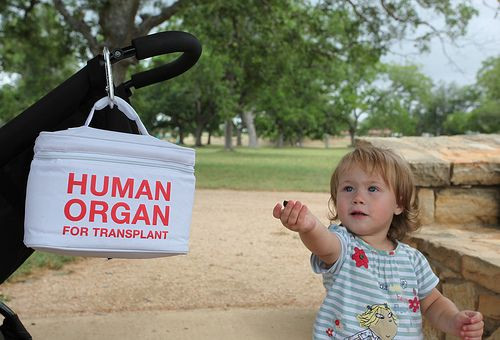Kidney Transplant Chain Saves 3 Lives, Brings 6 Closer Together

Being on the waiting list for an organ transplant can feel like a helpless experience — endless days and nights spent wondering if you or your loved one will ever find a match. For one Utah man, the kidney that he donated ended up setting in motion a chain of donor matches that gave renewed life to three people and, in the end, brought six closer together.
Rocket scientist Ted Bartling first decided to donate a kidney because he felt the need to give something back after years of taking.
"For at least 15 years, donating a kidney had been on my mind as something I could do to help somebody live a normal life like mine," Bartling, 51, told Yahoo! Shine. "They'll only take a kidney up until you're about 60. I can do small things for people, but sometimes we have to do the bigger things if we are capable."
The true reach of Bartling’s sentiment were unknown to him at the time. Also on the waiting list were 45-year-old Juan Romero, 40-year-old Brandy Jess, and 2-year-old Beckham Fershtut. Romero had been on dialysis for three years, and due to his rare B-blood type, couldn’t find a match. Jess had a donor lined up in her friend Kristy Buffington, but in the 11th hour before her transplant, Buffington turned out to be incompatible. And even though both of Beckham’s parents, Ari and Haley, offered one of their kidneys, neither was a match. Ari said he would donate a kidney to a stranger only if his son also received a match.
"The chain began with the child," said Dr. Jeffrey Campsen, who performed surgery on the donors. "He was weeks away from starting dialysis. For a 2-year-old it's incredibly difficult and shortens his lifespan."
To make matters worse, Beckham's kidneys were failing. He was inactive and irritable. His skin looked ashy. "And then we had a gentleman come forward who wanted to be what we call an altruistic donor," Campsen said.
The chain went like this: Bartling’s kidney went to Jess, Ari Feshtut’s went to Romero, and Buffington’s adult kidney went into Beckham’s tiny, toddler body. In total, the surgeries took two days to complete. When they finished, all six convened in the hallway to connect with their matches and with one another.
"The very first person that I met was the father of the child,” Campsen said. “It was very touching to meet the little boy. It's major surgery. There is not much room for an adult kidney in a child that young. You could tell he was very comforted by having anyone by his crib."
Beckham hadn’t been on dialysis yet, but would have started the treatment in the ensuing weeks. "If it had been years," Campsen said, "he might not have survived."
Kidney failure arises most often in children and the elderly, as dehydration can lead to renal complications more quickly. The kidneys are responsible for filtering out water, waste, and toxic substances from the body; their failure can lead to anemia, high blood pressure, and bone diseases due to impaired hormone production. Diabetics and the obese face greater risk for renal failure as well.
Renal complications also include chronic kidney disease (CKD), which develops slowly and causes a more gradual loss of function in the organ. In Romero’s case, dialysis was his only option, as kidney failure meant the waste build-up in his body required artificial means of extraction. Had Beckham’s kidney failure advanced further, he would’ve faced the same treatment. There are currently 90,000 people on the waiting list for transplants.
Luckily for him and his family, the generosity offered by Bartling allowed a missing piece of the puzzle to fit perfectly into place. Now, Campsen says, the boy’s prognosis is excellent and his energy has already returned. His parents, for their part, “look like they have had a 100-pound weight lifted from them."
"Kidney transplantation is medicine,but this was about a community coming together and helping each other,” the doctor said, adding that a wave of generosity had sent a ripple effect across Salt Lake City, all of Utah, and "perhaps even the nation itself."
Published by Medicaldaily.com



























